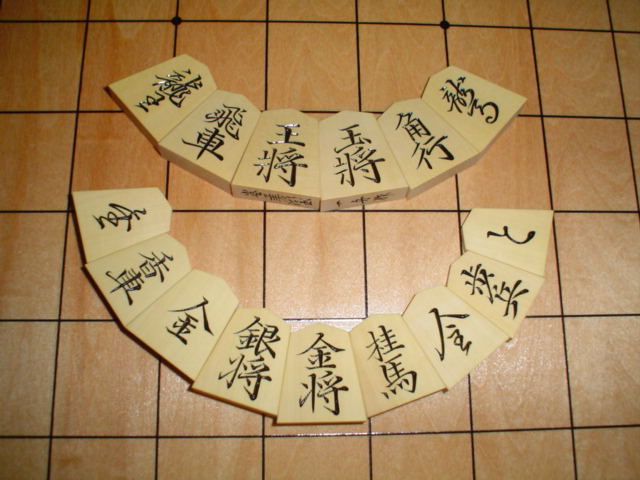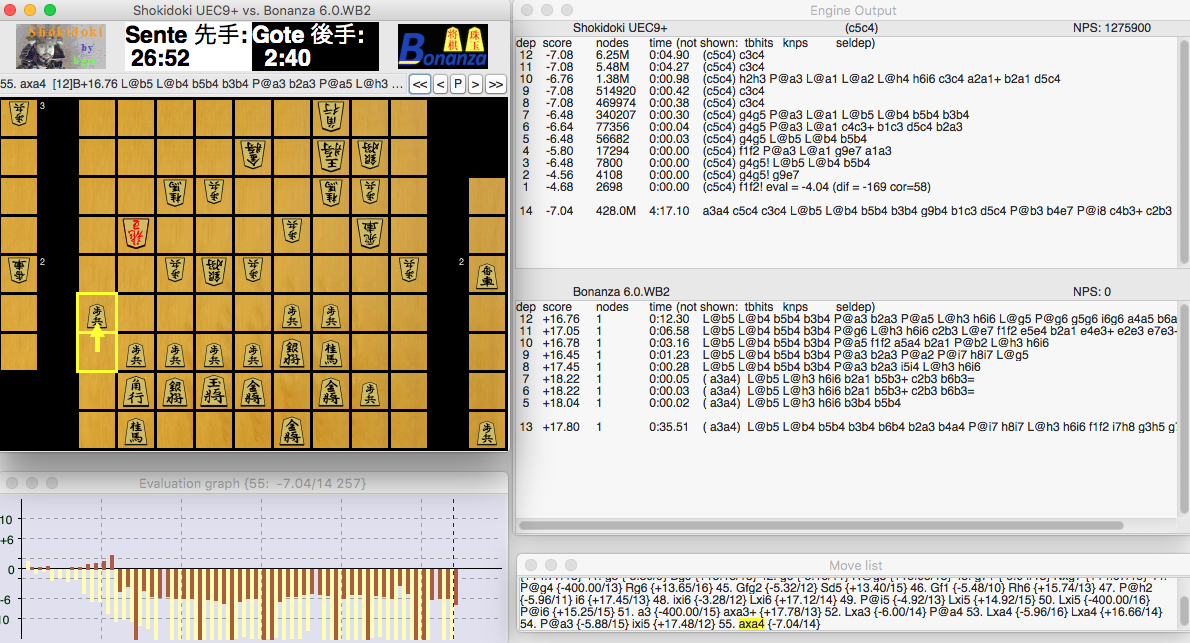|
List Of Shogi Video Games
This is a list of video games. Throughout the years, hundreds of games were released exclusively in Japan for several consoles. A few were released outside Japan. Sega SG-1000 * ''Serizawa Yadan no Tsume Shogi'' - 1983 Super Cassette Vision * ''Shogi Nyuumon'' - 1985 Sharp X68000 * ''Morita Shogi II'' - 1989 * ''Shogi Seiten'' - 1992 MSX * ''Naitou Kunio no Yume Shogi'' - 1984 * ''MSX Shogi'' - 1985 * ''Shogi Kyou'' - 1985 * ''Shogi Meijin'' - 1985 * ''Shogi'' - 1985 * ''Gunjin Shogi Gunshin Mars'' - 1986 * ''Tanigawa Kouji no Shogi Shinan'' - 1986 * ''Shogi'' - 1986 * '' Kisei'' - 1987 * ''Tanigawa Kouji no Shogi Shinan II'' - 1988 * ''Gunjin Shogi'' - 1988 Arcade * ''Shogi'' ( Alpha Denshi) * ''Shogi no Tatsujin'' - 1995 * ''Tenakichi Shogi Kai 2'' - 2011 Family Computer * '' Honshogi: Naitou Kudan Shogi Hiden'' - 1985 * '' Morita Shogi'' - 1987 * ''Tanigawa Kouji no Shogi Shinan II: Meijin e no Michi'' - 1988 * ''Famicom Meijin Sen'' - 1988 * ''Tanigawa Kouji no Shogi Shi ... [...More Info...] [...Related Items...] OR: [Wikipedia] [Google] [Baidu] |
Shogi
, also known as Japanese chess, is a strategy board game for two players. It is one of the most popular board games in Japan and is in the same family of games as Western chess, ''chaturanga, Xiangqi'', Indian chess, and '' janggi''. ''Shōgi'' means general's (''shō'' ) board game (''gi'' ). Western chess is sometimes called (''Seiyō Shōgi'' ) in Japan. Shogi was the earliest chess-related historical game to allow captured pieces to be returned to the board by the capturing player. This drop rule is speculated to have been invented in the 15th century and possibly connected to the practice of 15th century mercenaries switching loyalties when captured instead of being killed. The earliest predecessor of the game, chaturanga, originated in India in the sixth century, and the game was likely transmitted to Japan via China or Korea sometime after the Nara period."Shogi". ''Encyclopædia Britannica''. 2002. Shogi in its present form was played as early as the 16th century, while ... [...More Info...] [...Related Items...] OR: [Wikipedia] [Google] [Baidu] |
Morita Shogi 64
is a Japanese virtual board game for the Nintendo 64. It was released only in Japan in 1998. It is the indirect sequel to '' Saikyō Habu Shōgi'', a launch game for the Nintendo 64. It has a built-in RJ-11 Modem Connection port with which players were able to connect to (now defunct) servers to play against other players all around Japan. The game can be exploited for arbitrary code execution, allowing owners to run their own homebrew software. See also * Shogi * List of Nintendo 64 games References External linksCVE-2020-13109at the National Vulnerability Database The National Vulnerability Database (NVD) is the U.S. government repository of standards-based vulnerability management data represented using the Security Content Automation Protocol (SCAP). This data enables automation of vulnerability management, ... 1998 video games Cancelled 64DD games Japan-exclusive video games Nintendo 64 games Nintendo 64-only games Shogi video games Video games developed in Ja ... [...More Info...] [...Related Items...] OR: [Wikipedia] [Google] [Baidu] |
Shogi Video Games
, also known as Japanese chess, is a strategy board game for two players. It is one of the most popular board games in Japan and is in the same family of games as Western chess, ''chaturanga, Xiangqi'', Indian chess, and ''janggi''. ''Shōgi'' means general's (''shō'' ) board game (''gi'' ). Western chess is sometimes called (''Seiyō Shōgi'' ) in Japan. Shogi was the earliest chess-related historical game to allow captured pieces to be returned to the board by the capturing player. This drop rule is speculated to have been invented in the 15th century and possibly connected to the practice of 15th century mercenaries switching loyalties when captured instead of being killed. The earliest predecessor of the game, chaturanga, originated in India in the sixth century, and the game was likely transmitted to Japan via China or Korea sometime after the Nara period."Shogi". ''Encyclopædia Britannica''. 2002. Shogi in its present form was played as early as the 16th century, whil ... [...More Info...] [...Related Items...] OR: [Wikipedia] [Google] [Baidu] |
List Of Shogi Software
This is a list of shogi software (engines and/or Graphical User Interfaces): GUIs * 激指 (Gekisashi) * 将棋所 ( Shogidokoro) * ShogiGUI * 将棋ぶらうざQ (Shogi Browser Q) * XBoard Engines * AlphaZeroNot commercially available. * Apery ** Ukamuse (浮かむ瀬 – the 2016 release of Apery) * BlunderXX * Bonanza * elmo * Gikou (技巧) * GNUShogi * GPS Shogi * Honey Waffle * Laramie * Lesserkai * Lightning * nozomi * Ponanza * Ponanza Quartet * Qhapaq ** aperypaq (Apery SDT5 with Qhapaq learning) ** eloqhappa (elmo WCSC27 with Qhapaq learning) * relmo (elmo WCSC27 + rezero8), * rezero * Silent Majority * Spear * SSP * Tanuki (ナイツ・オブ・タヌキ WCSC27, 平成将棋合戦ぽんぽこ SDT5) * TJshogi * YaneuraOu (やねうら王) * Yomita (読み太) See also * Computer shogi * List of chess software * List of shogi video games References {{reflist, colwidth=30em External links 将棋フリーソフト· shogi engine rating site Shog ... [...More Info...] [...Related Items...] OR: [Wikipedia] [Google] [Baidu] |
Shotest Shogi
''Shotest Shogi'' is a 2008 shogi AI engine, made by Jeff Rollason, which was made into a video game for Windows and Xbox Live Arcade developed by British studios AI Factory and Rubicon Development. It provides a 3D environment designed to recreate a traditional Japanese room. The Xbox version includes a tutorial system, and all versions include an option to use a Western-style set of playing pieces for players who are unfamiliar with Japanese characters The modern Japanese writing system uses a combination of logographic kanji, which are adopted Chinese characters, and syllabic kana. Kana itself consists of a pair of syllabaries: hiragana, used primarily for native or naturalised Japanese wor .... The AI engine has been competing in the Computer Shogi Championships since 1997, and has achieved the highest ranking of any Western entry in all championships. It has competed in 12 World Championships, 2 Invitation ISF tournaments (Tokyo) and 3 Olympiads, winning one of t ... [...More Info...] [...Related Items...] OR: [Wikipedia] [Google] [Baidu] |
51 Worldwide Classics
''Clubhouse Games: 51 Worldwide Classics'', known as ''51 Worldwide Games'' in Europe and Australia, is a 2020 party video game developed by NDcube and published by Nintendo for the Nintendo Switch. This game is a successor to '' Clubhouse Games'' (2005) for the Nintendo DS and is a compilation of board, card, tabletop, and toy sports games from around the world. ''Clubhouse Games'' sold more than four million copies by April 2022. Gameplay Upon starting the game, the player chooses a toy figurine as an avatar and assigns a favorite game to it. This allows other players to see a globe where they can pick that game. These figurines act as guides for the games and offer trivia on the game, such as its history. The compilation of 51 games includes a variety of board, card, tabletop, and toy sports games such as Yacht Dice, Four-in-a-Row, Backgammon, Renegade, Checkers, Chess, Dominoes, Hanafuda, President, Golf, Fishing, Bowling, Darts, and Toy Baseball. Additionall ... [...More Info...] [...Related Items...] OR: [Wikipedia] [Google] [Baidu] |
Clubhouse Games
''Clubhouse Games'', known in some European countries as ''42 All-Time Classics'' and in Japanese as is a compilation video game developed by Agenda and published by Nintendo for the Nintendo DS, consisting of board, card, and tabletop games from around the world. It was released in Japan on November 3, 2005, in Europe on September 29, 2006, in North America on October 9, 2006, and in Australia on October 26, 2006. Some of the games included in the North American version are different from those included in the original Japanese version. On April 19, 2007, the North American version was released in Japan with support for the Nintendo Wi-Fi Connection service, as A follow up for the Nintendo Switch, '' Clubhouse Games: 51 Worldwide Classics'' (known as ''51 Worldwide Games'' in Europe and in Japanese), was developed by NDcube and released worldwide on June 5, 2020. Gameplay ''Clubhouse Games'' is a compilation of board, card, and tabletop games from around the world. The game ... [...More Info...] [...Related Items...] OR: [Wikipedia] [Google] [Baidu] |
42 All-Time Classics
''Clubhouse Games'', known in some European countries as ''42 All-Time Classics'' and in Japanese as is a compilation video game developed by Agenda and published by Nintendo for the Nintendo DS, consisting of board, card, and tabletop games from around the world. It was released in Japan on November 3, 2005, in Europe on September 29, 2006, in North America on October 9, 2006, and in Australia on October 26, 2006. Some of the games included in the North American version are different from those included in the original Japanese version. On April 19, 2007, the North American version was released in Japan with support for the Nintendo Wi-Fi Connection service, as A follow up for the Nintendo Switch, '' Clubhouse Games: 51 Worldwide Classics'' (known as ''51 Worldwide Games'' in Europe and in Japanese), was developed by NDcube and released worldwide on June 5, 2020. Gameplay ''Clubhouse Games'' is a compilation of board, card, and tabletop games from around the world. The g ... [...More Info...] [...Related Items...] OR: [Wikipedia] [Google] [Baidu] |


